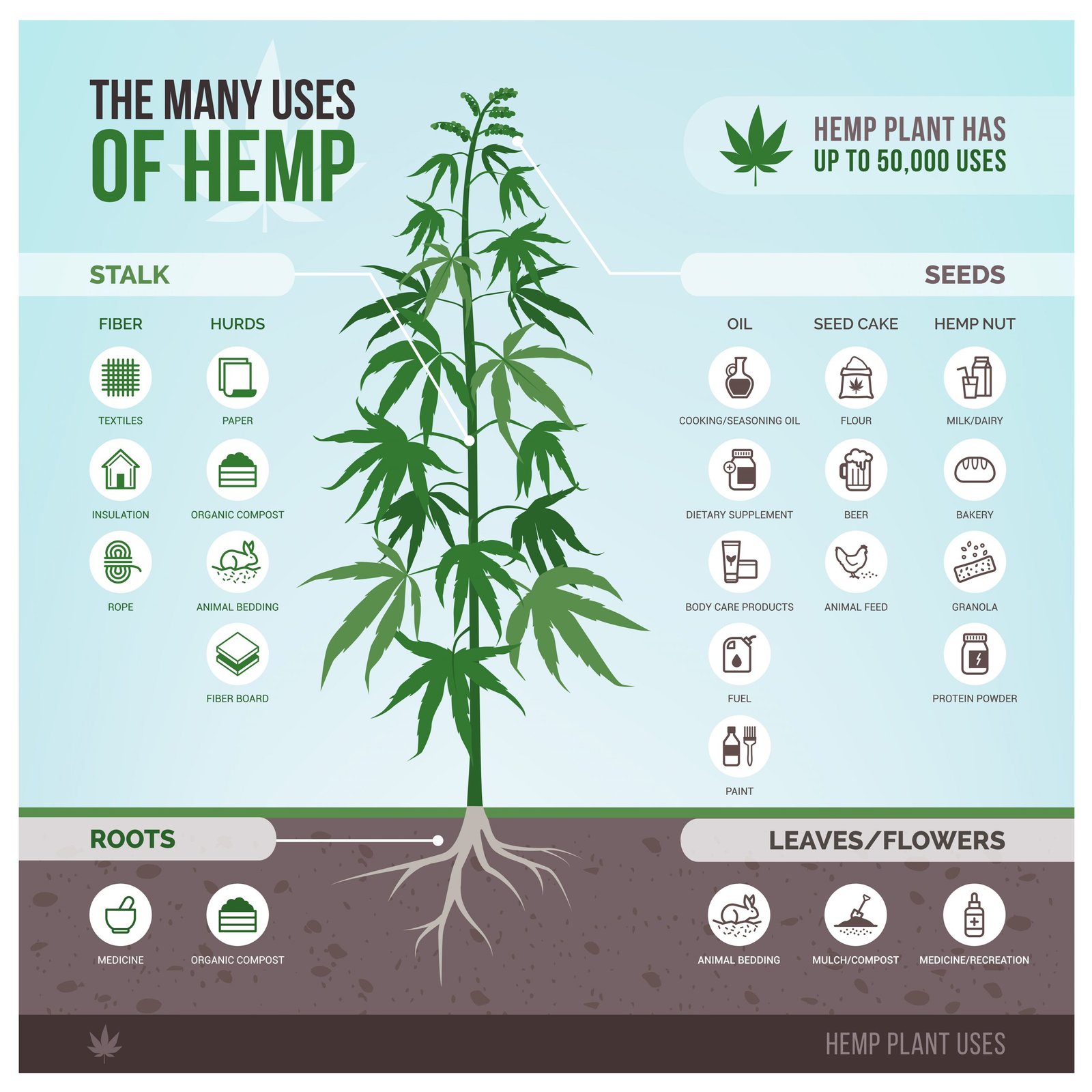The Versatile World of Hemp: Exploring Its Many Uses

Hemp, one of the oldest cultivated crops, has experienced a resurgence in popularity and utility, especially following the 2018 Farm Bill. Known scientifically as Cannabis sativa L., hemp is distinguished from its psychoactive cousin, marijuana, by its low THC content (0.3% or less). This versatile plant offers a multitude of uses across various industries, making it a valuable resource for sustainable practices and innovative products.
Industrial Applications
1. Fiber and Textiles
Hemp fibers are renowned for their strength, durability, and eco-friendliness. Historically, hemp has been used to produce ropes, sails, and clothing. Today, it continues to be a sustainable alternative to cotton and synthetic fibers. Hemp textiles are breathable, moisture-wicking, and resistant to mold and UV rays, making them ideal for clothing, accessories, and home furnishings.
2. Building Materials
Hempcrete, a biocomposite material made from hemp hurds (the woody core of the plant) and lime, is gaining traction in the construction industry. Hempcrete is lightweight, insulating, fire-resistant, and carbon-negative, offering a sustainable alternative to traditional building materials. Additionally, hemp fibers are used in the production of bioplastics, which can be molded into various forms, reducing reliance on petroleum-based plastics.
3. Paper
Hemp paper is more sustainable than traditional wood-based paper, requiring fewer chemicals and producing less waste. Hemp has a shorter growth cycle than trees, making it a renewable source for paper production. Historically used for documents, maps, and even currency, hemp paper is experiencing a revival in eco-friendly stationery, packaging, and printing industries.
Nutritional and Health Benefits
4. Food and Beverages
Hemp seeds are a nutritional powerhouse, packed with protein, essential fatty acids, vitamins, and minerals. They can be consumed raw, roasted, or processed into hemp seed oil, protein powder, and milk. Hemp seeds and oil are used in a variety of food products, including granola bars, smoothies, salad dressings, and baked goods, providing a healthy, plant-based nutritional boost.
5. Supplements
The legalization of hemp has spurred the growth of the cannabinoid industry, with compounds like CBD, CBG, and others gaining popularity for their potential health benefits. CBD, in particular, is widely used in supplements and wellness products for its anti-inflammatory, anti-anxiety, and pain-relief properties. These products come in various forms, such as oils, capsules, gummies, and topicals, catering to a wide range of consumer needs.
Environmental Benefits
6. Soil Health and Remediation
Hemp is a remarkable crop for soil health and phytoremediation. It has deep roots that help prevent soil erosion and improve soil structure. Hemp can also absorb heavy metals and toxins from the soil, making it a valuable tool for land reclamation and remediation projects. Its ability to grow in diverse climates and soil types further enhances its appeal as a sustainable agricultural crop.
7. Biofuels
Hemp biomass can be converted into biofuels, such as biodiesel and ethanol, offering a renewable energy source that can reduce reliance on fossil fuels. Hemp biofuels produce fewer greenhouse gases compared to conventional fuels, contributing to efforts to combat climate change and promote environmental sustainability.
Personal Care and Household Products
8. Skincare and Cosmetics
Hemp oil, rich in essential fatty acids and antioxidants, is a popular ingredient in skincare and cosmetic products. It is known for its moisturizing, anti-inflammatory, and anti-aging properties, making it beneficial for various skin types. Hemp-based products include lotions, creams, shampoos, conditioners, and soaps, providing natural and nourishing alternatives to conventional personal care items.
9. Household Goods
Hemp fibers and oils are used in the production of a variety of household goods, including cleaning products, detergents, and pet care items. Hemp’s natural properties make it an effective and eco-friendly ingredient in these products, reducing the need for harsh chemicals and synthetic materials.
Conclusion
Hemp’s versatility and sustainability make it a valuable resource across numerous industries. From textiles and construction materials to nutrition and personal care products, hemp offers eco-friendly solutions that promote health and environmental well-being. As research and innovation continue to expand the applications of hemp, this ancient plant is poised to play a significant role in the future of sustainable living.
Stay tuned to our blog for more insights into the fascinating world of hemp and its myriad uses.
